Podcast: Download (Duration: 40:49 — 37.5MB)
Get Notified Of Future Episodes Apple Podcasts | Spotify | Amazon Music | Android | Blubrry | Gaana | TuneIn | Deezer | Anghami | RSS | More
Interview highlights:
01:30 – One man’s business journey and the Jay Abraham effect
07:26 – How to brag without bragging
09:49 – The power of precise language
11:59 – Jay’s secret to note-free consultation
14:35 – Just how important are numbers, really?
15:36 – The unbelievable true story behind the controversial Mr. X
21:15 – Work-energy balance, and tuning one’s self
24:10 – The wins and caveats of revenue share deals
34:35 – Is retirement a consideration?
Be mentored in your own business journey by James Schramko
Transcription:
James: James Schramko here, welcome back to SuperFastBusiness.com. This will be Episode 683. Very special episode for me, because my guest today is the one and the only Jay Abraham. Welcome to the show, Jay.
Jay: Thank you, James. I’m sorry it’s taken so long, you’ve been generous and extended the invitation. I had scheduling conflicts, but what a privilege. Thank you.
James: That’s great. You know, I was going to run this episode, whether you came or not. Because you’ve had too significant an impact in my life to not share this with my audience, which was really my goal the whole time. There’s been little touch points in my life where it’s sort of boosted business into the next zone. Like in a game, when you play the game and it goes into extended time.
One man’s business journey and the Jay Abraham effect
For example, when I was 23, we found out we were having our first child. And I went into, of course, a state of panic because I was on a pretty low wage, my wife was on a low wage. And of course she was not going to be working. And then there was going to be three of us. So I had to get a job in sales. And I got myself a job at BMW selling. And this is in the mid-90s. And Tony Robbins was coming to town and someone in my sales team was going to see him. And as part of that conference, they gave out some book summaries. And this guy brought them to the office and they were lying on his desk, and I picked one of them up and there was this guy called Jay Abraham. And I’ve read this story about a milk bar that was not making enough profit. And Jay told this milk bar owner, listen, instead of asking people if they’d like an egg in their milkshake, ask them if they’d like one egg or two. And that just smacked me in the face. I’m like, this is brilliant. What an amazing switch.
Because I’d learned all about Tom Hopkins, and I’d been studying every sales book I could lay my hands on. I’d already been through Brian Tracy’s Psychology of Selling so many times. I actually wore the cassette out. Like, I hand-wrote that course. And this was something I hadn’t heard before.
And then I heard about, at the checkout cashier, we could put together a little bundle – we could basket up some of the single items and turn them into a more valuable package. And I thought, wow, this guy makes sense. So I looked up everything I could find on you in the mid-90s. And I love Getting Everything You Can Out Of All You’ve Got. I mean, it’s dog-eared. I’ve been saying this for 20 years when anyone ever asked, like, this is my favorite book of all time, and I’ve got at least 3000 books sitting on my shelf space.
Jay: That’s great. It was a good book. I wish it had more update on social media. But it was a good book.
James: I think it’s the best book. You know, I went on to great sales success. I was the top salesperson in BMW, and then I switched to Mercedes-Benz. And within a year of Mercedes-Benz, I was number one in Australia. And I went through to sales management, and then general sales management, and then general management. Along the way, I found this guy who wanted to sell and I thought, you know, I’m going to give him this book. So I went online, and I started Googling for the book. And there was this page there, and it was really compelling, and I wasn’t sure why. And it had highlighted things in italics, and it was Stephen Pierce and Rich Schefren. And they were saying, Listen, if you put your email here, we’ll give you some Jay Abraham reports. And I’m like, wow, I’m all in for that. So I put my name in. And then they said, Hey, if you actually give away this report to other people, then we’ll actually pay you commission. And I’m like, well, I’m in for that too.
So that’s the first introduction to ClickBank and name capture and copywriting, even though I didn’t know the technical name for it at the time. And from there, I started my little online journey. And I actually started helping other businesses, and everyone, like my local dry cleaner, my acting coach at the time, all these little businesses, home renovation businesses. I was writing them ads.
I did a triangulation deal with a smash repairer. He wanted to improve his business, and I wanted to buy a whole bunch of Dan Kennedy books at the time. And I said, Listen, you buy me the books, and I’ll read them and I’ll apply everything I learn on your business until you feel you’ve got 10 times value.
Jay: Exactly!
James: And this guy ended up with a Mercedes-Benz franchise. I mean, literally, he got a couple of million dollars a year out of that deal. So it was a fine upside.
And I mean, it goes on. I actually used money that I got from coaching clients to buy a laptop and then build my online business. And then years later, someone I was friendly with who I’d met through a business group said, you know, you like Jay Abraham, right? I said, I sure do. Like hands up, I’m a massive fan. And he said, we’re having him at a little private event in Las Vegas, you know, loft apartment, if you’d like to come. And I said, I’m in. So I hopped on a plane, I read Sticking Point Solution on the way there, I got to meet you and I shared with you about my business. And at the time, you said, “You sound like your business is actually one of the smartest businesses I’ve heard in the last year or two.” And that just lifted me about a thousand feet.
And you and I actually sat on a couch. There was, I think, a glass or two of red wine. And I think we spoke for about five or six hours straight. And I asked you everything I could think of, like, which was your favorite book. You told me Getting Everything You Can was your favorite, even though it mightn’t have sold the most. And I started exploring about what sort of deal structures you like. We got onto revenue shares and royalty deals. And I think your friend Spike was there as well, and he told me, look, go for percentage of revenue, it’s much easier than profit. Since then, I’ve started building those deals into my portfolio. And you actually knew that I was interested in this, because I was behind the scenes helping out some of the people in your team with your membership forum, podcast, and so forth. And we have so many people we’re connected to – Bond Halbert, Aaron Fletcher, Stephan Spencer, John Carlton, Roland Fraser, the list just goes on.
And I just really wanted to say thank you, in front of all of my audience, to say, like, the things you’ve sent me, the ideas you’ve shared with me have been pillars. To the point where when I was in Greece recently, and I was just looking at the Parthenon, and you know, thinking about, here he is again, this guy – his ideas are so solid. I mean, that thing got blown up in a war, and it’s still standing, it just goes to show. So you know, the reason I have multiple divisions in my business that are across multiple currencies, that have multiple traffic streams coming to it, is because of the foundational work that got put there.
Now, I’m not going to spend today digging really deep on all of the individual techniques, because there’s quite a few and I’m just going to recommend like straight up, go and get all of Jay Abraham’s books and materials. In fact, even on your website, you can opt in and you actually give away masses of value. And I’m sure that’s part of your strategy of preeminence where you’re pretty much like the business influencer before influencers were a thing. You know, that’s pretty much what preeminence is about. It’s being like, the guy. And I really want to ask you a few questions around that. So why don’t we start with, how do you brag without bragging?
How to brag without bragging
Jay: That’s a great question. What a great question. Well, there’s a couple of ways. First of all, you can preemptively, there’s a concept that I was introduced two years ago, James, I call it the Aikido School of Business, it’s using the power of the enemy against the enemy. And if the enemy is arrogance or hyperbole, you can defuse it right away. And you can say, we get a couple ways – you can say, “What I’m about to say may sound arrogant, brash, audacious. I don’t mean for it to be, and it’s not my intent. But facts are facts, it’s well-documented. And if I don’t establish this, you won’t appreciate the rest of what I’m going to say.” That’s one way of saying it.
“If the enemy is arrogance or hyperbole, you can defuse it right away.”
James: So that would be like an insulation technique. It’s, put it straight out there, and then push it to the side.
Jay: That’s one way. There’s two approaches to extolling anybody or anything. One is the person himself or herself explaining it; the other’s a third party. With a third party, you have license to be a lot more aggressive. So in other words, if I say, “I am so great,” you’re going to go, Oh, my God, what an arrogant prick. But if you say, “Jay Abraham is so great,” and if you’re known to your people, or even if you’re not, if you say, “Hey, you may not know me, but I influenced 10 million people around the world, I’ve created 50,000 documented online marketers, I’ve done this, and when I tell you about somebody, when I say they’re great, great is what they are, and here’s why.” That’s another way to do it.
A third way is just to establish achievements. You can say, “Before I tell you my story, I should probably tell you a little bit about my background,” and then you list: “I was involved in this (either company or product). I went from (this to that). I was involved in (this that went from that to that). I’m considered the progenitor of (this or that). These prominent people were mentees of mine, etc. And I’m telling you that…” Then you have to draw a reason why and humble it with humility. “I’m telling you this not to sound arrogant. I’m telling it just to establish the credibility – let’s see, the right word – the credibility and substance of what I bring to the discussion we’re about to have.” Something like that. There’s a couple of ways.
The power of precise language
James: That was awesome. While we’re on that, you were just searching for the right word then. And I asked you about that in the loft apartment. I said, “Jay, why do you use so many words when you talk, and you use a lot of words that are not in common English language?” And you gave me a fantastic response. I’d love it if you could share the reason why you have such a deep vocab and such a precise way of describing things.
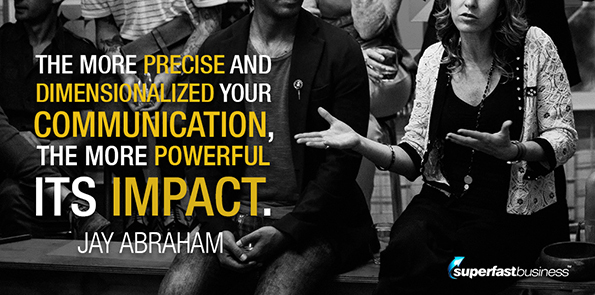 Jay: I can’t remember what my answer was. But there’s a duality of reasons. One is, I have very little education, but I made it a point from the time I was about 18 until about, I don’t know, 30, that every day, I wanted to master five or six very unique words. And so I would get at the source, I would look up words, and I would use them 20 or 30 times a day in conversation. And it evolved to the point that I realized the more precise and dimensionalized your communication, the more powerful its impact. That doesn’t mean that every word I use is the easiest; some of them are very sophisticated. But you’ll notice that I usually use triads as well; I like triplets. And there’s a reason, and that is, there’s science that threes are more powerful than twos or fives or ones. And I’ll normally try to express something in three different ways with the intent that one of them really hits a resonant sort of a comfort zone in people that they can refer, their reference level is strong in, but I like very precise communication.
Jay: I can’t remember what my answer was. But there’s a duality of reasons. One is, I have very little education, but I made it a point from the time I was about 18 until about, I don’t know, 30, that every day, I wanted to master five or six very unique words. And so I would get at the source, I would look up words, and I would use them 20 or 30 times a day in conversation. And it evolved to the point that I realized the more precise and dimensionalized your communication, the more powerful its impact. That doesn’t mean that every word I use is the easiest; some of them are very sophisticated. But you’ll notice that I usually use triads as well; I like triplets. And there’s a reason, and that is, there’s science that threes are more powerful than twos or fives or ones. And I’ll normally try to express something in three different ways with the intent that one of them really hits a resonant sort of a comfort zone in people that they can refer, their reference level is strong in, but I like very precise communication.
James: Yeah, that’s exactly what you said last time. So, very consistent.
Jay: I think that a lot of people default, and it’s gotten really worse online with sales copy. It’s very generic. It’s very superficial. It’s very general. And what people don’t realize, you’re imposing on the reader or the listener the responsibility of comprehending the implication, the meaning, the context. And I always thought that’s arrogant, ignorant and rude. I have to make it easy for you to see in a three-dimensional way what I’m trying to convey.
James: Yeah, that is perfect. Because ambiguity can cause a bit of miscommunication, especially if you don’t set the parameters correctly on a mission.
Jay’s secret to note-free consultation
You do a lot of consulting and workshops, and I see you up on stage in a chair answering questions, which as it turns out, is pretty much my favorite thing to do. I like to answer questions on the fly, which is how I’ve positioned my delivery service. My coaching puts me in a position where all the time I’m answering questions that help people. Now, I don’t often see you referencing anything, no cheat sheet or database or notepad. Is everything internalized, or do you actually store things or collect things, you know, in physical format, anywhere?
Jay: Yeah, I used to. In truth, I have thousands and thousands of notepads everywhere that I never look at, because it’s daunting. I think what I’m about to say is a gift in a being. When you’ve done a certain amount – I think you and I talked about this – when you’ve done a certain amount of industry scenarios, you achieve what I would call a form of universal intelligence. And by that, I mean you have such a spectrum and a depth, breadth of empirical, experiential understanding that as long as you don’t overthink it, your subconscious can access and it can pattern recognize and correlate very easily and it just, it becomes, I don’t really think about it anymore. I wouldn’t recommend that to most people. And I would say that you’d have to go through 40 years and a lot of arduous experiences to be able to do it. But you know, I trust in my experiences to draw very clarified and very appropriate answers, and it normally supports my expectations.
James: That is a great answer. I’ve seen, when I go to events where there are masterminds facilitated with experts, I see a lot of people – after just one or two rounds of 10, they’re done, they’re cooked. So I think it’s a muscle you have to build up over time, and there’s not many people.
Jay: It is, it’s fun. I mean, one of the greatest joys and privileges I think I have been blessed with is every year Tony Robbins and I do about seven hours together of problem-solving with his very, very, very high-end groups. And you can’t fake that, particularly when you’re going back and forth with him, until I have to even rise above normality to a higher level, which is very challenging. But a lot of people don’t have enough faith in their own experiences to draw from. And most people, frankly, don’t have the depth. I’m an anomaly that probably is very, very, very unique just in the diversity of fields that I’ve been involved in and the challenges and problems and opportunities I’ve been asked to try to deal with.
Just how important are the numbers, really?
James: You have a base of cost accounting. How important is accounting in what you do? Because I’ve discovered a lot of business owners don’t have much of a grasp on the numbers.
Jay: Yeah. I’m not as good at looking at, like, your financial statement. But I think understanding correlations, implications, allocations, yield, highest and best use of time, effort, money. The fact that all buyers aren’t worth the same, all media sources aren’t worth the same. The fact that the idea of a budget allocation or arbitrary marketing allocation is the stupidest thing in the world, because you’re either over or under-paying, and that if you understand allowable costs, and you understand allowable costs as it refers to different products, media, etc., you have an unlimited budget, when you understand that. And even if you don’t have the cash flow, if you can prove the lifetime value of the acquisition, you can get anybody to finance it for you. I think you can’t do that if you don’t know your numbers, do you?
The unbelievable true story behind the controversial Mr. X
James: I agree with you. And it’s funny, as you say those things, and they’re just embedded into my brain. Especially the one about budgets, I used to come up against that one a lot, especially in larger corporations. One of the best books on that topic is actually Mr. X. And there’s a funny story around the creation of that book. I wonder if you’d like to share that.
Jay: Sure. It’s a funny one. And that is that I had a very large client that I spent a lot of years with. And I gave him collections of every piece of body of work I had ever created. When our relationship stopped (really on good terms, but it stopped because I really much saturated my contribution level and it became marginalized) I found out that he had taken my stuff, put it into a book and was selling it for $400 a copy. This is basically back in the mid-90s. And I was incredulous, shocked. I was going to sue him. And I got a copy of the book. I thought, sh*t, this book is really great. Not even a book. It was a business-building master handbook, almost, that was just amazing. And he organized it masterfully and he articulated it brilliantly. And all these things were really good. So I contacted him and said, we can either sue each other, or I’ll pay your royalty and take it over. He was not doing a good job of selling it, but he’d done a masterful job of creating it. I was able to create a pretty cool story around the very premise, and we sold 72,000 copies in about 15 months at $377 a piece, and it bought me a beach house. So it was pretty cool.
James: Well, it’s probably bought me a beach house, too, if I’m being honest about it. I got two copies – I dog-eared one of them and the other one’s in shrink wrap, and it’s a treasured piece.
Jay: We don’t sell it. I should. About a year ago, Russell Brunson asked if he could print 600 of them and I let him. But this is funny. You’ll laugh about this, and maybe between you and I, there might be an opportunity. I took it off the market, not because it wasn’t selling; it was still selling 5000 copies a month. I took it off the market for two reasons – I get burnt out, just like I used to do a lot of seminars, huge ones. And now I don’t because I just couldn’t do anymore. But it was predicated on joint ventures and endorsements. And I had to set them all up and I had to write cover letters that were unique. And then as the internet came into being, it was grievously devoid of anything on online marketing. And I didn’t feel that was my strength. And I took it off the market with an intent to upgrade with a whole chapter; it was going to be a whole section on that. And I never got anybody to do it, so it’s been sitting and gathering dust, which is actually tragic because it’s so evergreen, and it’s so powerful and it’s so clear. And it’s really tragic that I don’t do anything with it. I should, it’s just I can’t. I haven’t gotten it together to add that section. If I ever get anybody who will give me a really good, balanced section that’s good, I probably would rerelease it or joint venture it with somebody, because it’s such a great book,
James: I was faced with that same dilemma with my book, which I know you’ve had a glance over, but I actually kept the online chapter out of it. And I made that an additional bonus chapter online, simply because when I was thinking about how much I like your book, I couldn’t see my book sitting on the shelf in 10 years from now. And if I put a digital chapter in there, you know, it’s just not going to be relevant, if you think about MySpace, or Netscape browser and stuff. That’s the surest way to make the book devalued over time.
Jay: Right. That’s the one problem, frankly, with getting everything. It’s a fabulous book, and it’s got 336 case study examples and reference illustrations. And it’s impossible to read that and not understand what to do, but it’s got a very antiquated and embarrassing chapter on websites, internet. And that’s it, I’d like to strip out. But I didn’t write it because I’m still, what I do is more macro strategy. It’s not really tactical online stuff. So I’m still not very strong in that.
James: I don’t think online is your strength. Having watched you for the last decade, you’ve had struggles with different partners on that, because there’s a lot of shifting sands in our space. You know, I would say someone like Russell Brunson who publishes books – he’s doing one about traffic as we speak – he’s the current powerhouse in that sort of area. A chapter from him might be a great solution. I definitely think the concepts in there are solid.
Jay: He was going to and then he got busy. Was it ClickFunnels?
James: Yep.
Jay: Yeah.
James: Kind of took off.
“You can be a powerhouse and then just burn out at doing something.”
Jay: But yeah, I mean, one of the most interesting things that can happen to somebody, and I don’t say this with remorse, but you can be a powerhouse and then just burn out at doing something. And even if it’s massively lucrative, “Yeah, I’m tired. I’ve been there and done that.” And that happened to me a couple of times. I mean, we did a quarter billion dollars of seminars in a couple of years. And one day I was standing there and I thought, I keep saying this over and over again, it’s a little boring. We have a couple of new theses, pardon me, that I just have been working on that are pretty cool that I might start teaching again. But same thing with selling Mr. X, I just got bored and wanted to do something else. But it probably was a mistake, because again, it was making not just money for me, but it was making the recipients of the book enormous amounts of money. We got 12,500 attendees to seminars, paying five to $25,000 20 years ago from buyers of that book, which is pretty amazing, because we only sold 72,000. So if you look at the numbers, it was profound.
Work-energy balance, and tuning one’s self
James: I really did want to ask you about that, about your energy, and if you spend time thinking about you. Like, do you work on your own business as well? Do you look for leverage points and ways to minimize the amount of wear and tear that you’ll put? Because I know you go to China, you get on planes, you’d stand in front of rooms. And I limit how much of that I do, because I’ve quickly realized this is hardcore, and I’m missing valuable surfing days. So do you spend time thinking about how you would tune yourself?
Jay: It’s challenging for a couple of reasons. My career has spanned four decades, so it’s a long time, and I’ve been very privileged the majority of them to make meaningful contribution, A, and to keep a qualitative reputation, B, which is something I’m proud of. But I never really built, I never liked my own business. I always loved other people’s, so I never really built it well. And then as we got into the online market, I had a very big challenge. Number one, my products and services were much more what I’d call holistic and global and strategic. And a lot of most online people are selling a tactic, which I’m not criticizing other than I don’t think tactics are the vehicle to sustain and really build a valuable asset-rich business.
“Tactics are not the vehicle to sustain and really build a valuable asset-rich business.”
But the more I knew my own flaws, the harder it was to write copy about how great I was. And every time I would go outside and try to get a copywriter who could write for me about me, it would default, in my opinion, to a lot of hyperbolic bullets and superficial stuff, and I didn’t want my name associated with it. So we never could find anything that sort of satisfied me, and I got, frankly, tired of creating products. So we didn’t really have new products. We have 12 programs I created just as boutique programs, more to see what could come out of my mind for three days on a subject. We sold maybe 15 people at five or 10 grand for a beta program, and I never sold it again. So I’ve got programs on relational capital, which I’m really happy.
James: I’ve got them. Actually, I went down to the local printing shop, and they actually took up a box that was the size of three or four old phone books, of all the stuff you’ve ever done. And I couldn’t help but think it, when I handed over the USB to the printer, I was thinking, does he realize he’s holding 100 million dollars in his hand right this minute? But he printed it out, I’d scraped the first one off the top and hopped on the airplane to the Maldives. And on the way to the Maldives, I was reading about relationship capital. And that really helped me boost along my revenue share deals, because that’s essentially what I’m doing, is building an investment portfolio of other people’s businesses that I pull together and we work together and they actually fit like modules into a greater, bigger portfolio.
Jay: That’s great.
The wins and caveats of revenue share deals
James: I’ve added three this month. So I’m really into that. And watching you, and when I see you in China and doing an event etc. I think, if I could just migrate these clients across to this kind of business model, I think that’s going to give me decades of wealth and experience without burning me out.
Jay: Yeah. I mean, if I were to give you advice or give anybody with marketing acuity advice, and I’m a bit of a hypocrite because it’s all I used to do, and then I stopped doing it because the kind of businesses I wanted to help were very hard to negotiate revenue shares, but it’s much more lucrative, it’s much more sustainable to not get paid fees but to get paid on a continuum on the enhanced results you produce by either increasing the performance of somebody’s existing revenue system, adding components to it, penetrating new avenues, bringing on new products, services, monetizing active/inactive buyers, prospects better for them, and having none of the compensation denominated in time and having the compensation be sustainable. You can do that. You’re much better off because you’ll earn a hundred times more for the time; you’ll be entitled to it for long periods, if not forever; and it’s sort of the equivalent of a bicycle in tenth gear – you have to work hard in the beginning, but if you’re right, you just have to keep the momentum and adjust it when it gets a little stale or when competition comes in. You have momentum, velocity working for you. But you have to make sure that you’re aligned with companies that have the capacity, the resources and the willingness to really deploy things, roll things out, reinvest.
“You want to have a portfolio of relationships that are very diverse.”
As long as you have the right partner, it’s great. Today, that’s a lot harder, because people aren’t as reliable as far as partnerships. But yeah, if you do that, I would recommend that. I think for you, having a new denominator is very beautiful. You want to have a portfolio of relationships that are very diverse. When I used to do it at my peak, it was stimulating because I knew for, example, on the 15th of the month I was in the money with 150 salespeople that were working for one client. After the 200,000 mailing of a million-piece mailing, I was in the money. After the third conference exhibit of the month out of 300 they were doing, I was in the money. And that’s really great, it was very diverse and I loved it. I just stopped and I never really started doing it at the level I did, but I think it’s brilliant for you. And you should do more and keep moving up the ladder.
And one of the things, just as a throwaway to you, even though this is public, I’ll give you an idea. I made a rather extraordinary amount of money from clients who rejected projects and applications that I would propose to them if they would turn it down. And my model used to be, I would get a quarter of the increase or of the profit depending on whether it was enhancement or newfound money. If they didn’t want to do it, I would buy the rights and give them the quarter.
James: Gotcha.
Jay: And I would make a ton of money. I made more doing that than anything because they didn’t see it. I was pretty certain it was going to be a home run or a grand slam. And I’d say, okay, you don’t want to do it, fine, I’ll do it, I’ll give you 25 percent. And most of them said okay, and then they wanted it, almost all of them, you’ll it see after a while – people are very interesting. In the beginning, and you’ve probably seen this, they love the idea of paying for results. And when it starts, it’s sort of okay, because they’re paying you a few thousand dollars. When it starts getting 80,000 a month, $150,000 a month, now they’re thinking, foul, you got the best of me. And then you have to really be mindful. I used to have a project strategy that when the checks started coming later than promised, I started negotiating a buyback to them because I knew that the relationship was getting negatively prejudiced because they’d grown and they brought on new people who were saying, why are you paying? Why are you paying? And I didn’t want to argue.
But I’ll tell you a fun story. My model was hilarious. Even though I had a couple, two, three-year contract with them, I could tell after about 18 months, it was getting stale with almost everybody. The more successful, the faster we’d get stale because they’d bring people on who were resentful and didn’t have a historic reference to what it was like before it got that successful. And it was a psychology factor that it was hard to overcome. So I would say, why don’t you just buy me out and I’ll let you pay in installments, 50 percent, we’ll divide it over 12 or 18 months. And that was not hard to do. But then, because I know human nature and it would trail up, I’d go back and say, you want to buy it out for a lump sum? I would short rate it for a single payment so that I was certain I wasn’t going to get screwed, so to speak. In the end, it’s a little hard, you have to be very vigilant because owners end up abdicating when you grow them. And managers end up being resentful. And it may sound like I’m jaded. I’m really not, I’m just being objective about, I don’t have a fault with human beings being human. But if you don’t understand the implications, you can be very disappointed in human beings.
James: I agree. I think you said the words before, saturated marginalization. I think of it as diminishing return. People often forget how little they had when you started, by the time they, you know, get high and mighty. I actually build in a buyout into the contract from day one. So we always know exactly what it will cost to exit for both parties.
Jay: And I think that’s really smart. And again, I didn’t do it as cleanly when I was at my peak of doing it. But that’s what I would recommend. And I also never, ever gave them ownership of the creative.
James: Same. I’m licensing my IP for non-exclusive use, and they can’t sell it and they can’t set up a clone business. And then if they want out, they can just pay the fee that’s agreed before we even start the deal. And I learned a lot of this by studying your stuff, seeing what the mistakes. I basically interviewed everyone I could find who does these kind of deals and I said, what went wrong? And I’ve protected against that in my contract.
Jay: And it’s smart. Because again, if you’re not careful, human beings are being human, but human beings can be unintentional sh*t. And the worst thing is if you build somebody’s business based on their personality, because then they believe all that you’ve created and they see themselves as being these Midas touch omnipotent people, which they might through osmosis in the association with you become, but it’s just a matter of time with most people. I mean, an enlightened entrepreneur should love paying you more than they make, because sooner or later, you’re out of the picture, and they own the asset. But there’s ego involved, there are underlings, resentment involved. I’m not trying to be negative…
James: No one’s really talking about this topic. So I mean, this is amazing. And it’s true. In fact, one of the most successful ones I’ve got is interestingly, it’s called 10XPRO, but it’s like a similar but, say, better version of ClickFunnels, right? It’s just taking off; people love it. But that deal came because the owner of that, the founder, who has really deep experience, he came to my Maldives mastermind a few years in a row just to meet me and to get to know me, and we surf together. And you know, if someone is doing a life-threatening activity with you weeks on end, over multiple years, you’ve got such deep level of trust and confidence in that person that you know that they’re going to behave in a similar way in their business. And it’s been such a great relationship because of that next level.
“A lot of things are flash-seared instead of crock-cooked.”
Jay: And that’s a rarity. And that’s probably the finest basis for a relationship. There’s an analogy I use in a lot of references. A lot of things are flash-seared instead of crock-cooked. I think that your point was really profound. And you figured a lot of these cool things out and you’re having a good time. The big problem with most people who have creative, whether it’s marketing, or strategic ability, they can figure out how to make ordinary income, but they can’t figure out how to leverage up adequately enough that they’re not constantly in strife, either having to perform for lots of people, or having to find new people to perform for.
James: Yeah. It’s covered in the end of Getting Everything You Can Out of All You’ve Got, where you say, work out your dream customer portfolio and identify your special skill and then go and marry them up. That was a profound concept for me – I realized that I wanted to be paid by multiple people, not one employer.
Jay: Yeah. Many of my colleagues don’t understand that I like to be very well-hedged. Early in my career, I had one big client that was paying me at peak, 35 years ago, $200,000 a month, which was really good money then. And I bought a brand new house and put every penny into it. And the business they were in got threatened, and I was the biggest single expense. And even though I had an agreement with them, they negated it. It would have been reserved, and it could have been litigated, but it put me in a very onerous position, and I swore I would never ever again, put myself in that kind of a control dependency on one person.
James: I try hard to protect my clients from any kind of single-point sensitivity. You see that one, a lot. You know, “Facebook’s banned me,” or “YouTube shut me down.”
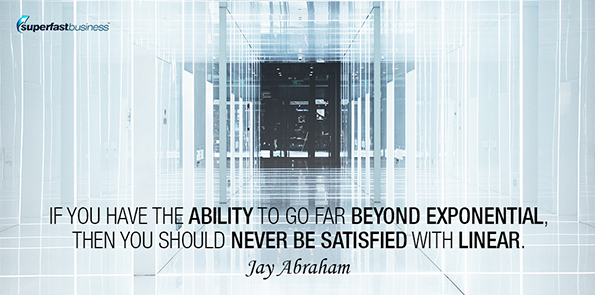 Jay: I have something new that I’ll send you, two versions. One is the PowerPoint and the other is a video. I have a whole new concept called Beyond Exponential, and it’s really killer. It’s predicated on the fact that I’ve created 30 different categories, each one of which has the potential of producing geometric profit growth. And I always wondered what geometry on geometry on geometry would be. And I never took the time to look it up. But I looked it up, and mathematically, there are five gradients above exponentiality that you can actually attain – pentation, hexation, hectation, octation – I can’t remember all the other ones. But if you have the ability to go far beyond exponential, then you should never be satisfied with linear. Plus, you should operate your business and your personal life always in the exponential zone, not in the incremental zone. And everything you do should be done with the highest current and residual yield. And most people do the opposite. It’s a pretty cool concept.
Jay: I have something new that I’ll send you, two versions. One is the PowerPoint and the other is a video. I have a whole new concept called Beyond Exponential, and it’s really killer. It’s predicated on the fact that I’ve created 30 different categories, each one of which has the potential of producing geometric profit growth. And I always wondered what geometry on geometry on geometry would be. And I never took the time to look it up. But I looked it up, and mathematically, there are five gradients above exponentiality that you can actually attain – pentation, hexation, hectation, octation – I can’t remember all the other ones. But if you have the ability to go far beyond exponential, then you should never be satisfied with linear. Plus, you should operate your business and your personal life always in the exponential zone, not in the incremental zone. And everything you do should be done with the highest current and residual yield. And most people do the opposite. It’s a pretty cool concept.
“Everything you do should be done with the highest current and residual yield.”
James: That sounds like business Inception. And I’m very interested in that.
Jay: I appreciate it. You are very interesting. So, we should try to talk; I’m very impressed with the way your mind works. And it sounds like you’re having a good time, which is, it’s more than half the battle. It’s really the majority of it. If you’re having a good time, everything else flows from that.
Is retirement a consideration?
James: I agree. So when do you retire as such? What’s your philosophy on the flow of how much you want to work versus how you spend your time now, as you’re coming to a different part of your career?
Jay: Well, it’s very interesting, because you mentioned something: for the last five years, because I’ve created an enormous quantity of marketing people worldwide, many of them are very respectful and acknowledge me, but a surprisingly large number want to be me, if that makes sense. So you have to compete against yourself, which is very interesting, particularly in a world where I’m not as transactionally strong online. So I spent the last five years with the duality of goals. One, to be the greatest benefactor to entrepreneurs worldwide that ever existed. And we give away, I think, better products, programs and content than many people sell. And we don’t even ask – or, it’s optional, but we don’t even ask an opt-in to get it and none of them sell anything. And that was done purposely to create an almost mythical brand.
But concurrently, for five years, I took on some of the most complex business clients imaginable, very few of which were in the online information field. Just a spectrum of things.
I just came back, for example, from outside of Washington, DC, where I was helping a client that does contracting for the Navy. They provide test pilots for the Navy planes, and they teach Navy pilots how to fly unmanned attack drones. But I get involved in really sophisticated stuff, and I did it to dramatically expand my strategic acuity. And I’ve done a pretty good job of it.
Now I’m more interested in going back to my roots and doing more deal flow like you’re talking about, but at pretty high levels where we get involved with equity deals and things like that. And I’m in age much older, but in knowledge much wiser. So we’re looking always at lots of deals, and I’m more interested in building a portfolio that has sustainability and asset value. I never was that, you know, I’ve done very well in my life, but I never was as big at acquiring assets as I was acquiring diverse business knowledge. And now it’s, you know, as I get older, it’s fun; I still enjoy it. I’ve become, which is sort of fun, I’ve become one of the four or five people in the war room. And it’s hilarious, since they’re all about digital marketing, and I don’t know anything about digital marketing. But I do all the hot seats and strategy stuff and it’s sort of fun. And I’m having a pretty good time.
Most of the people, because I charge a rather extraordinary amount for the time that I provide, so people don’t come to me with easy challenges, James; usually they’re complex. And they’re, you know, untangling Gordian knots and stuff like that. But it’s, I don’t know; right now, I’m still enjoying it. And I appear capable to hold my own in very complex environments. But I could probably say, when I can’t, I won’t. But right now, that’s been my life for 40 years, and I still enjoy it. So I’ll probably continue as long as I’m able to make meaningful impact, if that makes sense.
James: It does make sense. I used to work with my grandfather, who had a shed in the backyard, and he was a timber broker making three percent on all the orders that he placed with timber yards on behalf of builders. It’s funny, you know, he did that up until the last day. He just loved it. And he was good at it. He taught me most of the things I learned about telephone sales and being a good listener and strategy. And I could see that with you; I don’t see you stopping anytime soon. And I’m grateful that you at least started and continued, because it created a great foundation for the work I do. And to put this episode together has been, you know, this is on my wish list.
 Jay: Oh, that’s so nice. Thank you. But I’m impressed with you. The quality of your questions and the respect that you extend is remarkable, and it’s very appreciated by me. But I hope that my answers give clarity not just to you, but to your listeners, and they give inspiration, but also they give a context that very little happens in the world if you don’t make it happen.
Jay: Oh, that’s so nice. Thank you. But I’m impressed with you. The quality of your questions and the respect that you extend is remarkable, and it’s very appreciated by me. But I hope that my answers give clarity not just to you, but to your listeners, and they give inspiration, but also they give a context that very little happens in the world if you don’t make it happen.
James: I’m sure your answers are phenomenal. And I’m pretty sure people listening to this are at least of an intermediate nature, because of the type of content we have. And we’ll be sure to put all the links to your website. You’ve got a documentary out as well – we’ll link to that. And I just wanted to say, I appreciate it very much. And hopefully we’ll continue to have some discussions here and there.
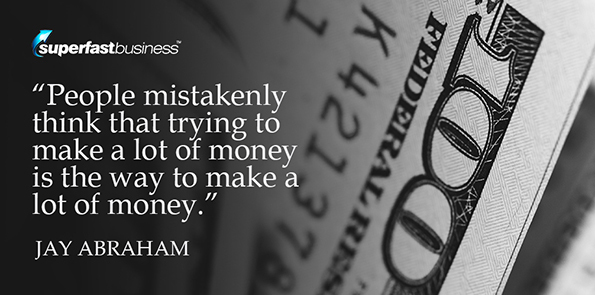 Jay: I would like that. You impressed me today, immensely, and it’s a pleasure. And if I have had an impact on you, it sounds like it was not only well-deserved, but that you’ve reciprocated by adding enormous value to people’s businesses and thus their lives and a lot of other people. And that’s really, that’s what it’s all about. You know, people mistakenly think that trying to make a lot of money is the way to make a lot of money.
Jay: I would like that. You impressed me today, immensely, and it’s a pleasure. And if I have had an impact on you, it sounds like it was not only well-deserved, but that you’ve reciprocated by adding enormous value to people’s businesses and thus their lives and a lot of other people. And that’s really, that’s what it’s all about. You know, people mistakenly think that trying to make a lot of money is the way to make a lot of money.
James: That’s like, that’s the byproduct really, isn’t it?
Jay: It is. When I started out, honest to goodness, I never even cared about it. I mean, I wanted to make a living because I had two kids and no education. But all I cared about was I met all these really passionate entrepreneurs that had the desire to add more value, benefit or advantage to segments of markets and I wanted to be part of it because it was exciting. You felt like you were on a crusade or a mission and you were doing something very purposeful and very different than just eking out a living. And it was exhilarating, and I was able to benefit financially, but it was literally as, you’re right – it was the byproduct of the intention to really make a difference and be a catalyst to help people who were adding value, get that value addition recognized by their market and responded to. But it was, yeah, that was the driver, was not making money.
James: It’s a wonderful time to be alive. Well thank you so much. I really appreciate this.
Jay: No, it’s my pleasure. And separately, I’ll have Desiree send you what I promised, if she’s out there now. If not, tomorrow. And please, you know, let’s do – let’s have dialogue, because you’re very impressive. I really forgot how deep and reflective you are as a human being. It’s really a delight. Thank you.
Access several decades’ worth of business knowhow inside JamesSchramko membership
Enjoy the show? Leave us a review on iTunes

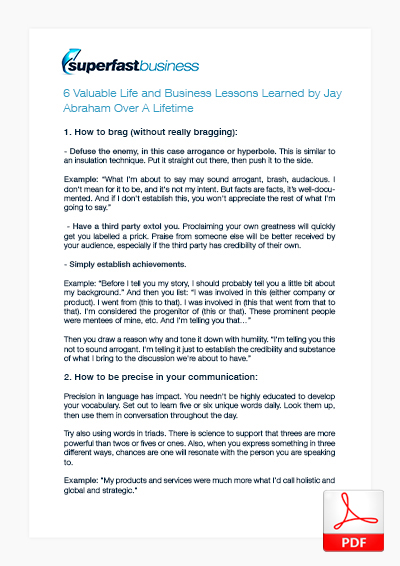
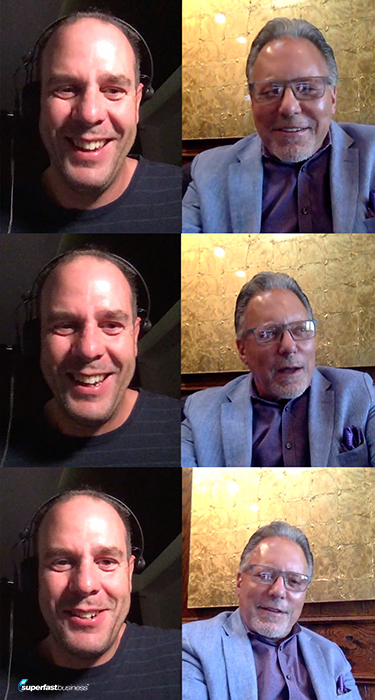









O M F’ing G!!!! What an extraordinary interview James, with an absolute legend!! You started the conversation with so much respect for Jay Abraham by demonstrating the catapulting impact he has had on your business & life. Then your first, well thought out question to Jay yielded the response you aim for in an interview, when Jay said, “What a great question James!”, then he launched into a detailed answer in the classic Jay Abraham style of explaining it in a duopoly of ways ;) … Then you followed up with the question that you asked him 7 years prior about the way he describe things and he replied with a very precise response to communicate why he replies in triads. The conversation escalated from there which kept me engaged with a smile from ear to ear =) I loved hearing the excitement & enthusiasm in your voice James. It really makes me proud to have you as my business coach, knowing that Jay Abraham has influenced you so much, which you have passed onto coaching me!! Jay isn’t about to retire yet and is a sharp as ever, even though he admitted that his online skillset isn’t great. it doesn’t matter when you have the experience and authority that he has. … Although, I’d love the opportunity to redesign his website to make it as awesome as he is!! Hope you’re reading this Jay ;) Anyways, go and listen to this episode if you haven’t already then go read Jay’s books. What a legend Jay is and what an awesome interview James!! Enjoy, Cheers =)
James, what an epic interview. Jay is so profound, I will be listening to this again and again. I could hear the reverence you have for him in your voice.
Many thanks,
James, You introduced me to Jay 10 years ago in your early podcasts. Now it has come full circle.
What a great interview, glad to see Jay still killing it!
That Mr. X book story is why Jay is the top honcho at what he does.
Awesome podcast mate!
Incredible interview. So much respect between you both. Two sharp minds sharing wisdom and business gold. Thank you for bringing this to us.
It’s so enjoyable when two inquisitive and brilliant minds meet. Really great James! Thank you!